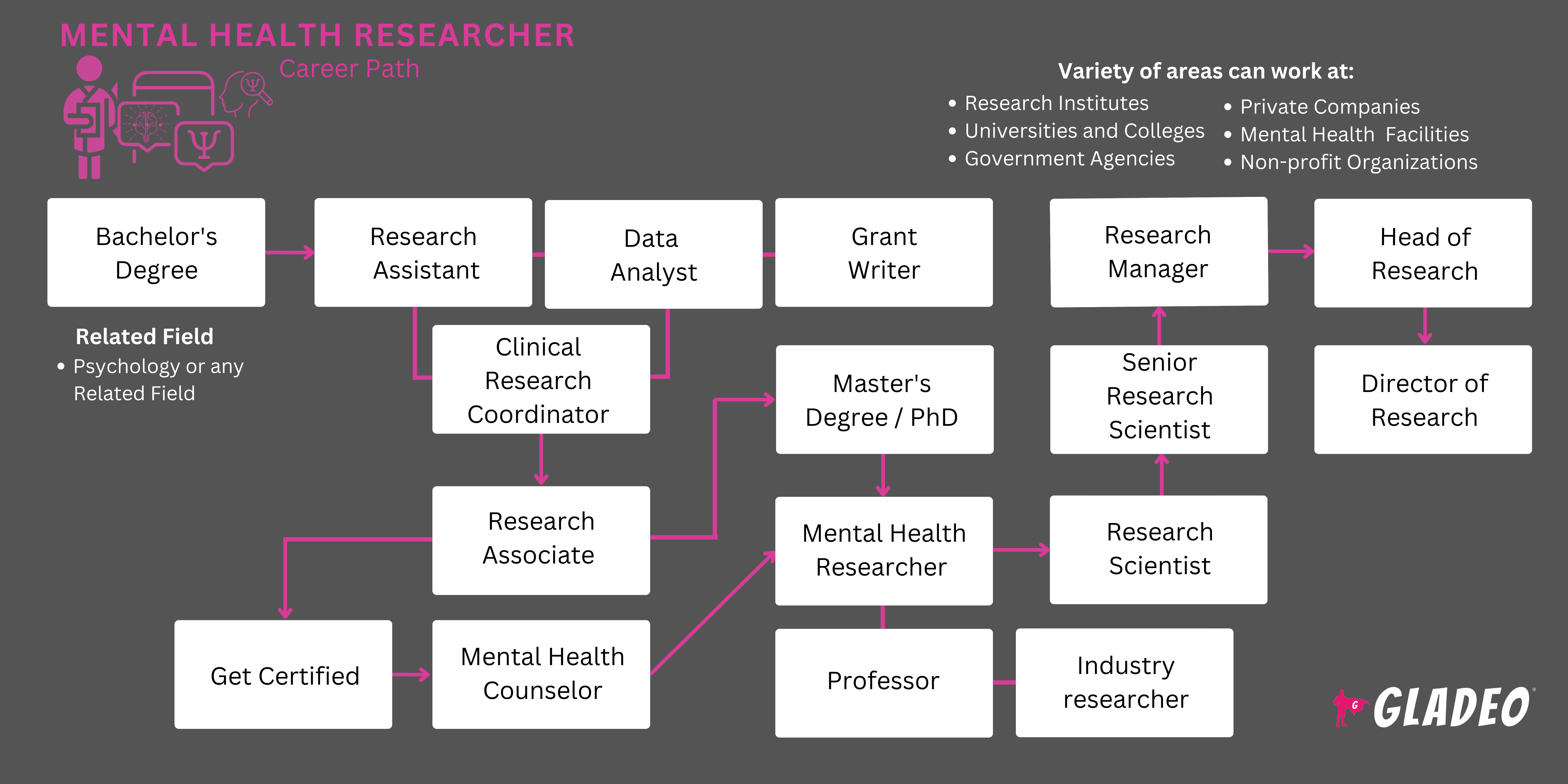Spotlights
Nhà nghiên cứu tâm thần, Nhà tâm lý học lâm sàng (tập trung nghiên cứu), Nhà khoa học sức khỏe hành vi, Nhà dịch tễ học tâm thần, Nhà tâm lý học nhận thức (tập trung nghiên cứu), Nhà tâm lý học thần kinh (tập trung nghiên cứu), Nhà phân tích chính sách sức khỏe tâm thần, Người đánh giá chương trình sức khỏe tâm thần, Nhà phân tích dữ liệu sức khỏe tâm thần, Nhà nghiên cứu tâm lý xã hội, Nhà tâm lý học sức khỏe (với trọng tâm nghiên cứu), Nhà nghiên cứu sức khỏe tâm thần cộng đồng
Mental health is simultaneously one of the most important and most overlooked aspects of human health. Why doesn’t it get the attention it needs? One reason is because it’s so complicated!
Medical science has a good understanding of the health issues related to our physical bodies. But the problems our minds can experience are harder to identify and address.
That’s why Mental Health Researchers have such important jobs. They contribute to the understanding of the human mind, help identify mental health issues, determine possible root causes, and develop effective treatments. Their work involves a great deal of designing and executing advanced research studies, analyzing data, and publishing findings.
Mental Health Researchers may specialize in areas such as depression, anxiety, schizophrenia, or PTSD. Their job requires a deep working knowledge of psychology, neuroscience, and statistical methods.
- Contributing to the understanding and treatment of mental health disorders
- Making an impact on individual and public health
- Opportunities to collaborate with experts in the field
- Shaping future mental health policies
Lịch làm việc
- Mental Health Researchers typically work full-time, often in academic or clinical settings. Their schedules can be demanding, requiring flexibility to accommodate deadlines.
Nhiệm vụ tiêu biểu
- Identify mental health conditions that require a deeper understanding
- Design studies, trials, and protocols to learn about chosen topics and test theories related to causes, prevention, and treatments
- Carry out studies and collect information through observation, interviews, and other sources
- Analyze and interpret study data. Record sessions or take notes, as appropriate
- Ensure study participant information is kept confidential
- Collaborate with fellow researchers, clinicians, and institutions. Share findings and devise ways to work together, if applicable
- Publish findings in scientific journals and blogs, while ensuring participant privacy
- Present findings at conferences and professional gatherings
- Apply for grants and funding to support research projects
Trách nhiệm bổ sung
- Maintain accurate records of research activities
- Ensure compliance with ethical guidelines and regulations
- Mentor and supervise students and junior researchers
- Participate in community outreach and education initiatives
- Keep up with research and developments, including software programs
Kỹ năng mềm
- Lắng nghe tích cực
- Khả năng thích ứng
- Tư duy phân tích
- Chú ý đến chi tiết
- Kỹ năng giao tiếp
- Tư duy phản biện
- Cảm
- Ethical judgment
- Độc lập
- Tính toàn vẹn
- Quan sát
- Tổ chức
- Kiên nhẫn
- Persistence
- Giải quyết vấn đề
- Làm việc theo nhóm
- Quản lý thời gian
Kỹ năng kỹ thuật
- Academic writing and publishing
- Artificial intelligence programs for research
- Data management
- Grant writing
- Neuroimaging techniques (e.g., MRI, fMRI)
- Psychometric testing
- Research design and methodology
- Statistical analysis software (e.g., SPSS, R, SAS)
- Tổ chức học thuật
- Hospitals and healthcare facilities
- Cơ quan chính phủ
- Tổ chức phi lợi nhuận
- Các công ty dược phẩm
- Private research firms
Mental Health Researchers face high expectations to produce tangible results. There’s always pressure to contribute to the field, which requires designing rigorous studies, analyzing complex data, and publishing results.
The research can be emotionally draining when dealing with vulnerable populations who have experienced trauma. However, such direct interaction with participants is sometimes needed, which demands a degree of professional detachment.
Researchers often work long hours to meet deadlines. They also have to secure funding, requiring skills in grant writing and networking. Despite the challenges, the rewards of advancing mental health and improving patient outcomes make the sacrifices worthwhile!
Technology such as AI and machine learning is playing a crucial role in analyzing complex data, finding patterns, and predicting outcomes. This, in turn, is enabling more accurate diagnoses and personalized treatment plans. Meanwhile, advances in genetics and neuroimaging allow researchers to tailor treatments to individual needs, boosting efficacy and reducing side effects.
There’s growing interest in the impacts of social, demographic, and environmental factors on mental health. This is prompting researchers to take a more holistic approach as they explore how such variables influence mental well-being and how that information can be used to potentially prevent problems.
Mental Health Researchers are very observant. They’re also curious about the human mind and human behavior. They likely enjoyed psychology and sociology growing up, and some of them may have had firsthand experience dealing with mental health issues within their families.
- Mental Health Researchers are usually doctors of psychology. They may start their educational journey with a bachelor’s in psychology, neuroscience, or a related field, followed by a master’s degree then PhD in psychology, psychiatry, or a related discipline
- Common course subjects include:
- Abnormal psychology
- Clinical psychology
- Cognitive neuroscience
- Developmental psychology
- Ethics in research
- Psychopharmacology
- Research methods
- Statistical Analysis
- Vital research experience is gained via internships, assistantships, or independent projects. Some researchers engage in clinical practice to inform their work
- Researchers don’t usually need to be certified or licensed – unless they are involved in clinical practice or if their research includes direct patient interaction
> Under such circumstances, they may need state licensure, which requires a set number of supervised hours of experience plus a passing score on the Examination for Professional Practice in Psychology
- Researchers often complete training in research ethics, specific techniques like neuroimaging or psychometrics, and certification in human subjects research
- Grant writing is another commonly needed skill, which can be learned through self-study, practice, or short online courses!
- Continuing education is necessary to keep up with advancements such as new technologies and methods
- Look for well-ranked programs in psychology, psychiatry, neuroscience, and related fields.
- Programs should ideally be accredited by the American Psychological Association and feature active research labs plus experienced faculty. There should also be ample opportunities for internships or other practical learning experiences.
- Screen each program’s website to learn about enrollment data, admissions requirements, and graduation statistics.
- Look for on-campus student organizations that could help you grow professionally!
- So sánh chi phí học phí và lệ phí, lưu ý chi phí trong tiểu bang và ngoài tiểu bang.
- Review scholarship and financial aid options, including federal aid Pell Grants.
- Take courses in psychology, sociology, biology, chemistry, English composition, and mathematics
- Participate in relevant science fair projects and psychology-related clubs
- Check out videos related to mental health research and read peer-reviewed journals
- Work with high school advisors to ensure you are ready for college-level coursework
- Decide what area of mental health research you’d like to focus on. Map out your long-term education plans
- Decide if you will attend college full-time or part-time due to work or other commitments
- Consider whether or not online or hybrid degrees are better for you
- Join professional and student organizations. Work on getting published in academic journals
- Study grant writing and strategies for applying for funding

- Complete applicable certification or licensure requirements (if needed in your state or for your area of specialization)
- Review job postings on portals such as Indeed.com or Mental Health America’s career center page
- Search online for tips to make your Mental Health Researcher resume more impactful
- Read sample interview questions and practice your job interview skills via mock interviews
- Take advantage of the resources offered by your school’s career center
- Ask professors and supervisors if you can list them as references or get letters of recommendation from them
- Before going into an interview, brush up on the latest news about the field. Be ready to discuss your insights about relevant trends and changes
- Talk with your supervisor about advancement opportunities
- Take on leadership roles in organizations like the American Psychological Association to network and access professional development resources
- Pursue advanced certifications or specialized training
- Continue to get published in peer-reviewed journals. Volunteer to be a peer reviewer yourself! Also, time permitting, think about writing a book!
- Attend workshops and conferences to stay updated on practices and technologies
- Collaborate on interdisciplinary projects. Join or create consortia for large-scale projects
- Seek ambitious grant funding to support and expand your research
Develop strong public speaking skills - Train and mentor new researchers and assistants thoroughly
- Teach academic courses at universities. Apply for postgraduate fellowships
- Participate in international research communities
- Maintain high ethical standards and a reputation for diligence and integrity
- Consider relocating if necessary to move up!
Trang web
- American Academy of Child and Adolescent Psychiatry
- Hiệp hội Trị liệu Hôn nhân và Gia đình Hoa Kỳ
- American Association of Suicidology
- American Board of Professional Neuropsychology
- American Board of Professional Psychology
- Hiệp hội Tư vấn Hoa Kỳ
- Hiệp hội Nghiên cứu Giáo dục Hoa Kỳ
- Học viện Trị liệu Gia đình Hoa Kỳ
- American Group Psychotherapy Association
- American Mental Health Counselors Association
- American Neuropsychiatric Association
- Hiệp hội Tâm lý Hoa Kỳ
- Hiệp hội thôi miên lâm sàng Hoa Kỳ
- American Telemedicine Association
- APA Division of School Psychology
- Hiệp hội các liệu pháp hành vi và nhận thức
- Association for Behavior Analysis International
- Association for Psychological Science
- Association of Psychology Postdoctoral Internship Centers
- Association of State and Provincial Psychology Boards
- ClinicalTrials.gov
- Hội đồng dành cho trẻ em đặc biệt
- Eastern Psychological Association
- Hiệp hội quốc tế EMDR
- International Congress of Cognitive Psychotherapy
- International Neuropsychological Society
- Junior Researchers in EARLI
- Midwestern Psychological Association
- National Academy of Neuropsychology
- National Alliance for the Mentally Ill
- National Association of Cognitive-Behavioral Therapists
- National Association of School Psychologists
- Hiệp hội nhân viên xã hội quốc gia
- National Black Counseling Psychologists
- Hội đồng quốc gia về tư vấn được chứng nhận
- National Institute of Mental Health
- National Register of Health Service Psychologists
- New England Psychological Association
- PubMed
- ResearchGate
- Rocky Mountain Psychological Association
- Society for Health Psychology
- Society for the Advancement of Psychotherapy
- Society of Behavioral Medicine
- Society of Clinical Psychology
- Society of Counseling Psychology, APA Division 17
- Society of Pediatric Psychology
- Southeastern Psychological Association
- Southwestern Psychological Association
- Association for Behavior Analysis International
- VA Medical Centers
- Western Psychological Association
- World Federation for Mental Health
Sách vở
- Research Methods in Psychology, by John Shaughnessy, Eugene Zechmeister, and Jeanne Zechmeister
- Statistical Methods for Psychology, by David C. Howell
- The Anatomy of Hope, by Jerome Groopman
Mental Health Researchers are critical behind-the-scenes subject matter experts. But such research-intense roles aren’t everybody’s cup of tea! That’s why we’ve put together a list of related occupations below for you to check out!
- Advanced Practice Psychiatric Nurse
- Behavioral Therapist
- Clinical Neuropsychologist
- Clinical Psychologist
- Nhân viên xã hội chăm sóc sức khỏe
- Health Policy Analyst
- Chuyên gia trị liệu hôn nhân và gia đình
- Mental Health Counselor
- Neuropsychologist
- Neuroscientist
- Nhà trị liệu nghề nghiệp
- Psychiatrist
- Public Health Researcher
- School Psychologists
- Substance Abuse Social Worker
Nguồn cấp tin tức

Việc làm nổi bật

Các khóa học và công cụ trực tuyến








